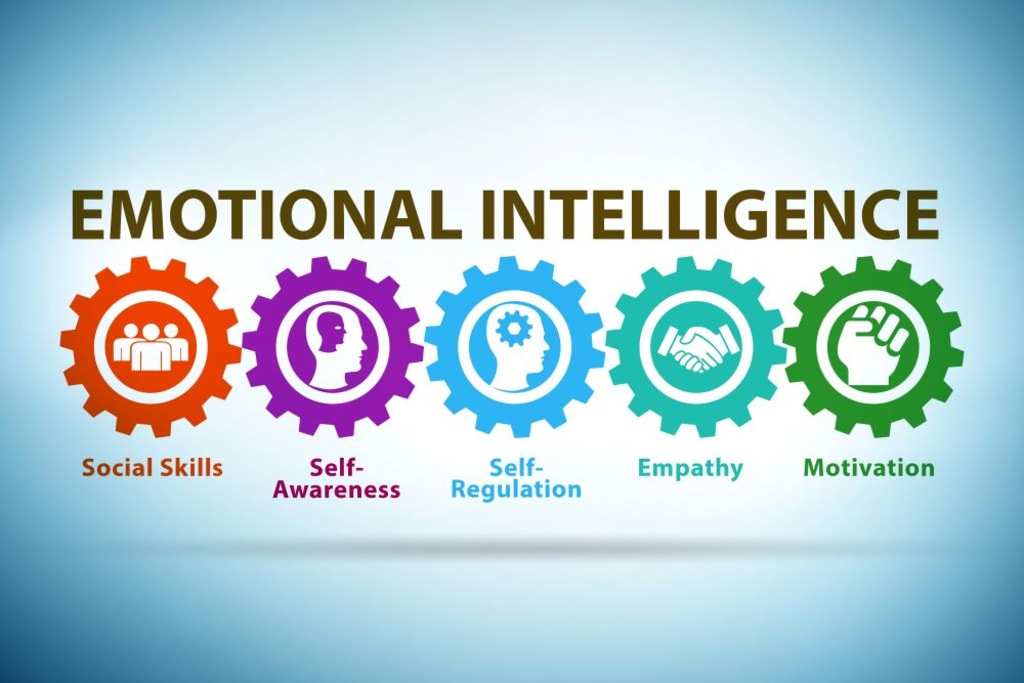THE POWER OF EMOTIONAL INTELLIGENCE IN RELATIONSHIPS
EMOTIONAL INTELLIGENCE 101

THE POWER OF EMOTIONAL INTELLIGENCE IN RELATIONSHIPS
Emotional intelligence, also known as emotional quotient (EQ), refers to the ability to understand, manage, and effectively express one's own emotions, as well as the emotions of others. It involves recognizing, comprehending, and managing one's own emotions and others' emotions in a manner that fosters healthy relationships and positive outcomes. In this article, we will delve into the power of emotional intelligence in relationships, how it can impact and shape the dynamics between individuals, and the steps one can take to improve their emotional intelligence.
One of the key aspects of emotional intelligence is self-awareness. This refers to the ability to identify and understand one's own emotions and how they influence thoughts and behavior. Individuals who possess high levels of self-awareness are better equipped to manage their emotions, respond to challenging situations in a more balanced and rational manner, and build stronger relationships. On the other hand, individuals who lack self-awareness may struggle with regulating their emotions, experience difficulty in managing conflicts, and have trouble building and maintaining healthy relationships.
Emotional intelligence also encompasses empathy, which is the ability to understand and share the feelings of others. Empathetic individuals are better able to connect with others and build trust and rapport, which is crucial for forming healthy and meaningful relationships. This can include understanding the motivations and feelings behind a person's behavior, and being able to respond in a supportive and understanding manner.
The ability to manage emotions is another critical component of emotional intelligence. This involves being able to regulate one's own emotions, as well as being able to effectively manage conflicts and difficult conversations. For example, individuals who possess high levels of emotional intelligence are better equipped to handle stressful or emotionally charged situations, and can use empathy and active listening skills to resolve conflicts in a manner that is respectful and solution-focused.
In relationships, emotional intelligence can have a profound impact on the dynamics between individuals. Individuals who possess high levels of emotional intelligence are better equipped to understand the emotions of their partner and respond in a supportive and understanding manner. This can lead to stronger bonds, increased trust, and a greater sense of intimacy and connection.
On the other hand, individuals who lack emotional intelligence may struggle with building and maintaining healthy relationships. For example, they may struggle with understanding and managing their own emotions, leading to conflict and misunderstandings. Additionally, they may lack empathy, making it difficult to connect with others and build trust and rapport.
To improve emotional intelligence, individuals can engage in a variety of practices and activities. These can include:
1. Mindfulness practices: This can include meditation, yoga, or simply taking time to reflect and be present in the moment. These practices can help individuals increase self-awareness and become more attuned to their emotions and the emotions of others.
2. Emotional self-reflection: This involves taking time to reflect on one's own emotions and experiences, and exploring how they may impact thoughts and behavior. This can be done through journaling, therapy, or other reflective practices.
3. Empathy training: This can involve learning active listening skills, practicing empathy through role-playing exercises, or simply spending time with individuals from diverse backgrounds to gain a deeper understanding of different perspectives and experiences.
4. Communication skills: Improving communication skills can help individuals effectively manage their emotions and conflicts, and build stronger relationships. This can include learning conflict resolution strategies, practicing active listening, and working to improve nonverbal communication skills such as body language and facial expressions.
It is important to note that emotional intelligence is a continuous process of growth and development. Just as one can always improve physical fitness through exercise and training, emotional intelligence can be improved through consistent practice and effort.
Ultimately, the power of emotional intelligence in relationships lies in its ability to foster healthy and meaningful connections between individuals. By understanding, managing, and expressing emotions in a positive and effective manner, individuals can build stronger relationships, improve communication, and resolve conflicts in a more productive and positive way. Whether in personal relationships or professional settings, emotional intelligence is a valuable tool for building healthy and fulfilling relationships.
In conclusion, emotional intelligence is a critical component of healthy and successful relationships. By cultivating self-awareness, empathy, emotional management skills, and effective communication, individuals can improve their emotional intelligence and build stronger, more meaningful connections with those around them. Whether in personal relationships or professional settings, emotional intelligence has the power to transform and enhance relationships, leading to a more fulfilling and joyful life.
CLICK HERE TO LEARN HOW TO MAKE HIM WANT YOU ALL THE TIME!!!





Comments
There are no comments for this story
Be the first to respond and start the conversation.